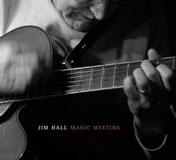Home » Jazz Articles » Album Review » Jim Hall: Magic Meeting
Jim Hall: Magic Meeting
For his first trio recording in ten years and also, coincidentally, his first album on the fledgling cooperative ArtistShare label, which has already seen a successful first release by Maria Schneider, Hall demonstrates that aging has nothing to do with complacency. From the first notes of his original composition "Bent Blue," he demonstrates as contemporary a musical vision as artists half his age, all the while maintaining the grace and elegance that has characterized his playing since he emerged in the '50s playing with artists including Jimmy Giuffre and Bill Evans. Edginess is sometimes mistakenly corresponded with modernity, and while Hall is nothing but smooth tones and rounded edges, his harmonic conception continues to evolve, with lines that are at times soft and approachable, other times more oblique and abstruse.
Half the programme is dedicated to more outer-reaching material, including the aforementioned "Bent Blue"; saxophonist Joe Lovano's "Blackwell's Message," where drummer Lewis Nash coaxes all manner of sound with sticks, brushes, hands and fingers; and the folk-like "Canto Neruda," which is a showcase for bassist Scott Colley's always inventive solo work. The other half, while comprised of more standard fare including "Skylark," "Body and Soul" and the Sonny Rollins favourite, "St. Thomas," where Hall uses signal processing to give his instrument a steel drum-like texture, may be more immediately approachable, but Hall, Colley and Nash make them equally vital vehicles for collective improvisation. Hall has often been called the Bill Evans of the guitar, but his conception is far more spacious. Capable of swinging bebop lines, Hall is more disposed to favouring simple but distinguished lines where the decay of the note is as important as the note itself.
Hall's guitar sound alternates between a warm hollow body tone, which may be processed with effects like a harmonizer on "Bent Blue" and "Blackwell's Message," and a more natural acoustic sound. Every sound is faithfully recorded by engineer David Oakes, who manages to capture every nuance and every subtle shading from each member of the trio. Magic Meeting represents another advanced watermark in a career filled with high points, refined and graceful while highlighting an artist who continues to search for new avenues with every recording.
Magic Meeting can only be purchased through ArtistShare or Jim Hall on the web.
Track Listing
Bent Blue; Blackwell's Message; Skylark; Canto Neruda; Furnished Flats; Body and Soul; St. Thomas.
Personnel
Jim Hall
guitarJim Hall: guitar; Scott Colley: bass; Lewis Nash: drums.
Album information
Title: Magic Meeting | Year Released: 2004 | Record Label: ArtistShare
< Previous
Dave Stryker: Rides Again & Shades Be...
Next >
Detained at the Blue Note
Comments
Tags
For the Love of Jazz
 All About Jazz has been a pillar of jazz since 1995, championing it as an art form and, more importantly, supporting the musicians who create it. Our enduring commitment has made "AAJ" one of the most culturally important websites of its kind, read by hundreds of thousands of fans, musicians and industry figures every month.
All About Jazz has been a pillar of jazz since 1995, championing it as an art form and, more importantly, supporting the musicians who create it. Our enduring commitment has made "AAJ" one of the most culturally important websites of its kind, read by hundreds of thousands of fans, musicians and industry figures every month.




















